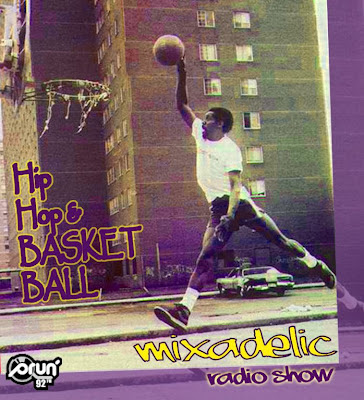The
other day, as I was riding in my car listening to music, I started thinking
about my two favorite topics—basketball and hip hop. I usually think about one or the other, but
rarely does my mind race about both. Are
there any connections between the two?
If so, what are the connections?
My internal conversation caused me to flashback to a hip hop album, The
Lost Boyz’ Love Peace & Nappiness. On that album the group played a clip of
Allen Iverson talking about his rookie season in the NBA. That skit reminded me that Allen Iverson was
one of the first guys to usher in the hip hop era into the NBA. Although that is true, the infusion of the
hip hop culture and basketball started before Iverson.
Let
me take a moment and point out some of the connections between hip hop and
basketball. Some of the greatest
basketball players and hip hop artists were raised in urban environments. Think about it: Allen Iverson, Lebron James,
Carmelo Anthony were all raised in urban environments. On the hip hop side, T.I., Nas, B.I.G.,
Jay-Z, and Snoop Dogg were all raised in urban environments. Hip hop was born out of struggle, defiance
and a way for young people to express themselves. Basketball was not born out of struggle, but
to many inner city youth, it symbolizes an opportunity for a better life for
their families; in that respect, basketball epitomizes struggle and expression. Hip hop artists are exploited by record
owners and guess what, so are basketball players. Hip hop is dominated by young 20-something
year old African American males and so is basketball.
Ironically, the biggest consumers of both hip hop music and basketball
are non-African Americans. The two are
inextricably intertwined.
Sometimes
people discuss hip hop or rap as a genre of music. Those individuals underestimate the impact of
the hip hip culture. It embodies language, fashion, attitude,
and music. In the NBA, although Michael
Jordan is not considered a representative of the culture, his decision to wear
longer, baggy shorts and to wear an ear ring was a by-product of the defiance of the hip hop culture. In the college game, in the early
1990’s, Michigan’s Fab Five started a trend of wearing long, baggy shorts with
black shoes and socks. They proclaimed
to the world that they loved hip hop.
They also expressed the ugly reality of exploitation of basketball
players. In the mid 1990’s Allen Iverson
entered the NBA. At that time, he
represented the perfect storm between hip hop and basketball. He was young, rebellious
and talented. He was born and raised in
an urban environment, but was able to overcome significant obstacles on his way
to super stardom. He wore his hair in
corn rows, his arms were filled with tattoos (not initially), his shorts were
baggy, he infamously wore fitted hats and platinum chains to press
conferences. He said that he wanted to
do things his way and he did.
The
NBA profited off of the hip hop culture.
During half time shows, you could often hear hip hop music being played
over PA systems, or hear commentators making hip hop references. David Stern and the other “powers-that-be”
used the hip hop culture to market to a more urban demographic. Many players during that time wore clothes
that were comfortable for them and not necessarily business professional or
even business casual attire. Although
David Stern benefited from the hip hop culture, he yearned to control it. Therefore, it was no surprise to me that he
passed a set of rules which require players to dress professionally when
sitting on the bench. Now, if you look at the NBA players on the sidelines,
they usually have on a suit or at the very least, a sports jacket. That was his way of minimizing hip hop’s
impact.
Although
David Stern attempted to stamp out or at least minimize the impact of hip hop,
it is still alive and well. Players
still wear diamond earrings, and bracelets. The only difference is that those are now
accessories that go with Tom Ford tailored suits. Lebron James is a huge hip hop fan and he
expresses himself before games by listening to the music on his headphones, or
blasting the music in the locker room. Hip
hop is also seen in the ownership ranks of the NBA with Jay-Z being a minority
owner of the Brooklyn Nets. Hip hop is
displayed at All-Star weekend. Many hip
hop artists perform and/or attend events during one of the NBA’s biggest
weekends. Their appearances help drive
even more people to the festivities and consequently contribute to the NBA’s
profit margin. You see, the marriage
between hip hop and basketball cannot be eradicated. The two are forever intertwined.
Instagram: Mrminter2011
Instagram: Mrminter2011
Peace



Basketball Drills for High School: How to Become a High School Basketball Coach Basketball Coach
ReplyDelete